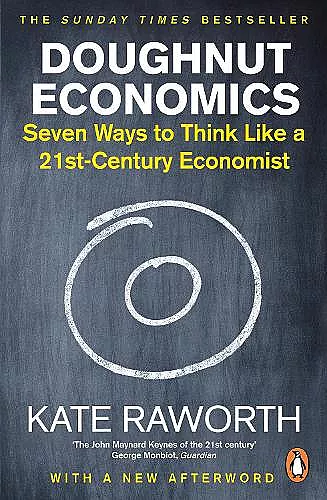Doughnut Economics
Seven Ways to Think Like a 21st-Century Economist
Format:Paperback
Publisher:Cornerstone
Published:22nd Feb '18
Should be back in stock very soon

This insightful book critiques traditional economics and offers a new model for sustainable development, making Doughnut Economics a must-read for those seeking innovative solutions.
In Doughnut Economics, renowned economist Kate Raworth presents a compelling critique of traditional economic models that have failed to address pressing global issues. She highlights the relentless financial crises, extreme wealth inequalities, and environmental degradation that plague our current systems. Raworth argues that mainstream economics has led us astray by promoting the myth of the 'rational economic man' and prioritizing growth at all costs, which has ultimately harmed both society and the planet.
The author identifies seven critical flaws in conventional economic thinking and proposes an alternative framework that seeks to balance human needs with ecological sustainability. This new model, which she aptly describes as a 'doughnut', envisions a safe and just space for humanity that operates within the planet's ecological limits. By addressing the shortcomings of current economic practices, Doughnut Economics offers a roadmap for creating a more equitable and sustainable future.
Ambitious and thought-provoking, the book challenges readers to rethink their understanding of economics and encourages innovative solutions to the challenges of the 21st century. With its mix of academic rigor and accessible writing, Doughnut Economics has garnered praise from various quarters, positioning itself as an essential read for anyone interested in the future of our economic systems and their impact on society and the environment.
I’ve never seen [the concepts in Doughnut Economics]laid out so clearly, compellingly, or cheekily. Social entrepreneurs, it’s doughnut time – and I strongly recommend that you take a bite. -- Four Books Every Social Entrepreneur Should Read * Forbes *
Doughnut Economics shows how to ensure dignity and prosperity for all people. * Huffington Post *
A compelling and timely intervention. -- Caroline Lucas MP, Books of the Year * The Ecologist *
A book you will need to know about . . . Kate writes beautifully . . . If only 10% of the ideas get implemented, the world will be a much better place. -- World Bank blog
A sharp, insightful call for a shift in thinking . . . Raworth’s energetic, layperson-friendly writing makes her concept accessible as well as intriguing. * Publishers Weekly *
Kate Raworth, formerly of Oxfam, shows that the undulations of equality and justice are really very profound . . . [Her] aim is to adjust human use of the processes of planetary dynamics so that the overall outcome of development is survival in peace, health, prosperity and companionship. * British Academy Review *
Proposes a new economic model – one that embeds the human economy within the natural world and within society, rather than being distinct from either. * The Ecologist *
An innovative vision about how we could refocus away from growth to thriving. * Daily Mail *
A brand new way of conceptualising economic development without being tied to infinite growth . . . A useful idea. * Guardian *
There are some really important economic and political thinkers around at the moment – such as Kate Raworth's Doughnut Economics . . . I get the sense that a major period of new thinking and political creativity is coming. -- Andrew Marr * Guardian *
An admirable attempt to broaden the horizons of economic thinking. -- Martin Wolf, Books of the Year * Financial Times *
Kate Raworth's well-received Doughnut Economics makes clear . . . [that] we have to enter a new age of thought, of communication, of politics. -- Natalie Bennett * The Ecologist *
This is sharp, significant scholarship . . . Thrilling. * Times Higher Education *
Required summer reading for Labour politicians and activists. * openDemocracy *
Another look at measuring growth . . . Raworth makes several key suggestions for reform. * MoneyWeek *
At last – an economic model that won't destroy the planet . . . I see [Raworth] as the John Maynard Keynes of the 21st Century: by reframing the economy, she allows us to change our view of who we are, where we stand, and what we want to be. -- George Monbiot * Guardian *
Asks some simple and pertinent questions. Why do we tax employment, through payroll taxes, but not the use of such scarce resources as fresh water, the Earth’s minerals, wood and soil? [Raworth's] biggest question, however, is one that terrifies all mainstream economists: is ‘growth’ endless? -- Andrew Marr * Spectator *
[Reveals] the huge hold in the standard economic model . . . offers a mountaintop view of the world. * Knowledge@Wharton: The Journal of Wharton Business School *
Judiciously combining history, theory, anecdotes and diagrams, [Raworth] provides a narrative that is easy to follow . . . Worthwhile and challenging. * Frontline *
A radical and solidly-argued book . . . Plausible and informative. * El Pais *
ISBN: 9781847941398
Dimensions: 196mm x 128mm x 24mm
Weight: 308g
384 pages